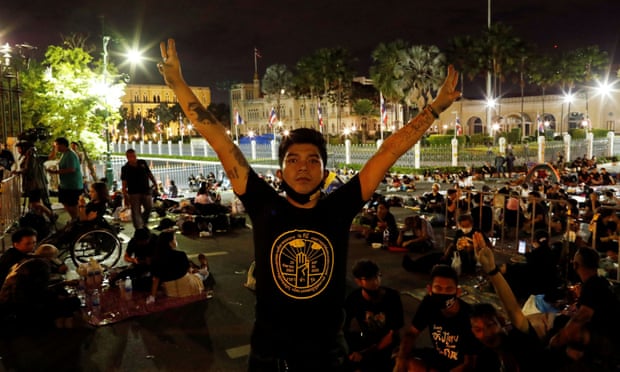Protest leaders arrested and publication of news that could harm national security banned as authorities crack down on dissent
Thailand’s prime minister has declared a “severe” state of emergency in Bangkok, while police have arrested more than 20 people, including prominent protest leaders, in a crackdown on the country’s pro-democracy movement.
Under the new emergency measures, gatherings of five or more people have been banned, as has the publication of news or online information that “could create fear” or “affect national security”. It follows a major rally on Wednesday, in which protesters repeated calls for democratic reforms, including to the country’s powerful monarchy.
Early on Thursday morning, riot police advanced on protesters outside Government House, where they had camped to demand the resignation of prime minister Prayuth Chan-ocha.
Protest leaders are among those arrested, including human rights lawyer Anon Nampa, and prominent student activists Parit Chiwarak, known as Penguin, and Panusaya Sithijirawattanakul, known as Rung.
Thailand is still under a state of emergency that was introduced to control the spread of the coronavirus. The government said the new powers were a response to growing demonstrations and the obstruction of a royal motorcade on Wednesday, which was heckled by protesters. The government also cited economic damage and the risk of spreading coronavirus.
“It is extremely necessary to introduce an urgent measure to end this situation effectively and promptly to maintain peace and order,” the decree said.
According to Human Rights Watch, the new emergency measures allows police to detain the protesters without charge for up to 30 days with no access to lawyers or family.
“Rights to freedom of speech and holding peaceful, public assemblies are on the chopping block from a government that is now showing its truly dictatorial nature,” said Phil Robertson, Deputy Director, Asia Division at Human Rights Watch.
On Wednesday, tens of thousands of people took to the streets of Bangkok to call for the resignation of the prime minister, Prayuth, who first came to power during the 2014 coup. They have also demanded a new constitution, which they say unfairly allowed Prayuth to retain power during last year’s elections, and curbs to the power and wealth of the monarchy – an institution protected by a lese majesty law and long considered untouchable.
During Wednesday’s rally, a royal motorcade drove past crowds of protesters, who chanted “my taxes” and raised a symbolic three-finger salute, a gesture of defiance.
In a statement, Amnesty International said the assemblies were overwhelmingly peaceful and that the arrests were “clearly designed to stamp out dissent, and sow fear in anyone who sympathizes with the protesters’ views.”
Despite the crackdown on protesters, students have vowed to continue demonstrating. The protest group Free Youth, said the arrests were “a violent action with zero legitimacy,” and that they would gather on Thursday afternoon.
“Under a true democratic country, demonstration is a basic right. Noone should get arrested because they speak truth,” the group said. “This is an action to perpetuate the authoritarian power of the state, not for the greater good of the people. The state avows the monarchy as one of the reasons to declare the decree. Therefore, it can be asserted that the monarchy is standing against democracy.”
Deputy police spokesman Kissana Phathanacharoe said student leaders calling for a protest on Thursday were “clearly breaking the law”.
“Those who attend will be breaking the law. You cannot say that they are not aware of the order. We are making it clear,” Kissana told a press conference.

